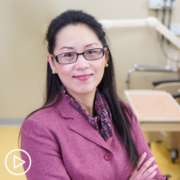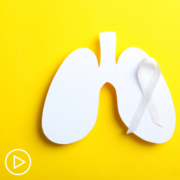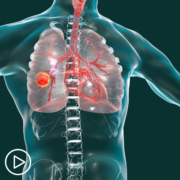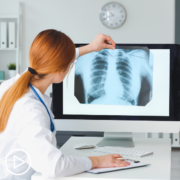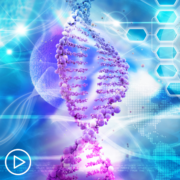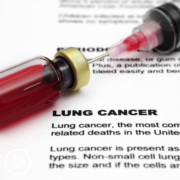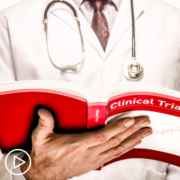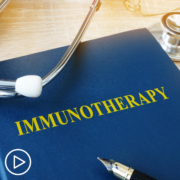PODCAST: What Non-Small Cell Lung Cancer Treatment is Right for You?
What’s the best approach for YOUR lung cancer? Dr. Isabel Preeshagul discusses the importance of engaging in your lung cancer care decisions, shares advice for working with your team to determine a treatment approach, and reviews factors that affect therapy options. Dr. Preeshagul also provides an update on the latest research and clinical trials.
Dr. Isabel Preeshagul is a thoracic medical oncologist at Memorial Sloan Kettering Cancer Center. Learn more about Dr. Preeshagul.
Download Program Resource Guide
See More From INSIST! Lung Cancer
Transcript:
Katherine Banwell:
Hello and welcome. I’m Katherine Banwell, your host for today’s program. Today, we’ll discuss the latest advances in non-small cell lung cancer care as part of our Insist series, which encourages patients to play an active role and insist on better care. Before we get into the discussion, please remember that this program is not a substitute for seeking medical advice. Please refer to your healthcare team about what might be best for you. Well, let’s meet our guest today. Joining me is Dr. Isabel Preeshagul. Dr. Preeshagul, it’s so good to have you with us. Thank you. Would you introduce yourself?
Dr. Isabel Preeshagul:
Yes. Thank you so much for having me and for the very kind introduction. My name’s Isabel Preeshagul. I am a Thoracic Medical Oncologist at Memorial Sloan Kettering Cancer Center, and it is a huge honor to be here with you today.
Katherine Banwell:
Well, we’re so glad to have you with us. I’d like to start with a question pertaining to our series title, Insist. Why is it essential for patients to collaborate with their providers on care treatment decisions?
Dr. Isabel Preeshagul:
So, collaborating is so important, right? I always tell my patients this is not a dictatorship, right? This is a collaborative effort where I’m here to guide you, but you are the captain of the ship.
You are the one that needs to make all of the decisions, and I’m here to make sure that the ship goes in a smooth direction, so making sure we have open lines of communication that the patients and their caregivers feel comfortable talking to me and my team and also vice versa and that we trust each other. It’s so important because we are going for a marathon, right? We’re not going for a sprint. This is a long-term relationship, whether we’re treating for cure or we’re treating you with palliative intent and it’s treatable but not curable. We’re going to be following with each other for a long time.
Katherine Banwell:
A lung cancer healthcare team, of course, consists of a number of different providers. Would you tell us about the various members on a team?
Dr. Isabel Preeshagul:
Sure. So, there is – there are the people that do the scheduling, that make sure that the CAT scan is scheduled, that the MRI is done, your chemo gets scheduled, all of that. The schedulers are super important and an integral part of our team.
And then we also have our office coordinators that answers the phone calls and passes along the messages and assists with scheduling and sort of sets expectations and is the face of the practice. Then you have an office practice nurse or an oncology practice nurse who is the doctor’s right hand, making sure that the patients get proper chemotherapy teaches, making sure that they understand about possible side effects, risks versus benefits, making sure medications are up to date, assessing symptoms.
They are sort of the front line when it comes to any patient call they’re triaging, and they’re escalating or deescalating. That would be the office practice nurse. And then you have an advanced care practitioner, an APP. You either have a nurse practitioner or a PA that’s working with you that’s sometimes seeing patients independently, sometimes putting chemotherapy orders, you know, really serving as almost as another doctor.
If for some reason there is something that the doctor’s not available to do, the doctor needs in a pinch, or my patients that are almost at long-term follow-up that are doing great that are just kind of coasting, I will share with my NP and make sure that they know her just as well as they know me. And sometimes there’s a fellow or there’s a resident or there’s a med student that’s part of the team as well because see one, do one, teach one. It’s really important to teach those that are coming after you and serve as mentors and really include them in part of the team and part of the decision-making. And then you have the doctor that just kind of oversees everything.
Katherine Banwell:
Of course. How would you define treatment goals for people with lung cancer?
Dr. Isabel Preeshagul:
So, the goal of treatment, I think, is really contingent upon someone’s stage, but it’s also contingent upon what’s important to the patient, right? So, we have patients that are stage I all the way to stage IIIC that we treat with intention to cure.
And patients that have stage IV disease, it’s treatable but not curable. So, I am very transparent with that as long as I have the information to have that discussion. With that being said, there are some patients with stage IIIdisease or stage I disease that don’t really want treatment and want to focus on quality of life. And that’s okay too. And in which case, you know, at some point, their cancer will likely progress. How quickly or when that will happen, we don’t know. Could they pass from something else? It’s possible. But you really need to talk about what’s important to the patient, because it’s not always cut and dry.
Katherine Banwell:
As you mentioned, Dr. Preeshagul, there are several different support members on a team. What would you say to patients or even care partners who can sometimes feel like they’re bothering their healthcare team with their questions and comments?
Dr. Isabel Preeshagul:
So, we do get that concern a lot. And I always say, “I’m here for you 24/7. And, if it’s not me, it’s someone that’s just as qualified to answer your questions no matter what.”
“And I would rather get a phone call at 3:00 a.m. than get a phone call at 9:00 a.m., and you need to go to the hospital right now or God forbid something happened. I get a phone call from someone in the ICU that you went overnight and terrible things happened. So, I want the phone calls to come through to keep you out of the hospital and keep you from going south. So, call me.” And I never try to – I don’t try to outline contingency plans or criteria of what would warrant a call, because then you end up getting in trouble.
I always just tell my patient, “Think about how you’re feeling now in front of me. If you’re feeling any different than how you feel at this very moment, call me.”
Katherine Banwell:
Good advice. I’d like to turn to the clinical side of non-small cell lung cancer. What tests help you identify the type and stage of lung cancer?
Dr. Isabel Preeshagul:
Obviously, you need a CAT scan. You need a CAT scan of the chest, abdomen, pelvis, and you need an MRI brain and a PET scan.
Those are really the gold standards for determining clinical staging. In regards to pathologic staging, it’s really important to have tissue samplings. So, you biopsy a site of disease that’s concerning to you. If it looks like there’s only disease in the chest, you want to biopsy the site where there’s the tumor, and then you talk with your thoracic surgery or pulmonary team to determine the best way to sample the mediastinum for full staging.
Katherine Banwell:
Why is an accurate diagnosis so important?
Dr. Isabel Preeshagul:
So, an accurate diagnosis is so important because lung cancer is by no means black and white anymore. There are so many histologic subtypes that we are learning about. There are so many different molecular drivers that we are learning about. So, making sure you have the right diagnosis, full and next-generation sequencing testing, all of the imaging that you need could really make or break your treatment plan.
Katherine Banwell:
Dr. Preeshagul, let’s talk about biomarker testing. How is biomarker testing for lung cancer different from hereditary genetic testing?
Dr. Isabel Preeshagul:
So, we do do hereditary genetic testing for lung cancer patients as well. So, I think let’s backtrack a little bit. When you’re doing on a patient, there’s germline mutations and there’s somatic mutations. And germline mutations are mutations that you might get from Mom and Dad that they got from their parents and so on and so forth that you could give to your children or your brother and sister or whatever. So, that’s germline testing that could be passed along.
That would be like BRCA or any other APC gene, but we are learning more and more that there are mutations in lung cancer that do have a hereditary aspect to them. So, we are learning now that while we do somatic testing, which is to find a mutation that just spontaneously happened in your tumor all on its own, it’s really important to pair that with germline testing to make sure that there isn’t some kind of heritable mutation that’s also driving this lung cancer.
Katherine Banwell:
You mentioned hereditary genetic testing. Should family members of people with lung cancer undergo genetic testing then just to be reassured?
Dr. Isabel Preeshagul:
So, if there is a germline mutation, then they should – the family members should be referred to a geneticist to have that discussion.
Katherine Banwell:
What are common lung cancer biomarkers?
Dr. Isabel Preeshagul:
So, we have nine biomarkers within approval right now, but there are so many. There’s more than I could even talk about today. But some of the more common ones are EGFR, ALK, ROS1, MET exon 14. You have KRAS, KRAS-G12C, which is a newer one. We have NTRK. We have RET. The list goes on, HER2. I could talk for – there’s not enough time on this Zoom video to talk about all of the mutations. But there are nine mutations with approvals as of now to date, this very moment. That could change tomorrow.
Katherine Banwell:
Of course, it could. How do biomarkers in lung cancer affect treatment options for lung cancer patients?
Dr. Isabel Preeshagul:
So, it used to only be in stage IV, but now we are learning that biomarker testing is really important from the get-go because we have induction or neoadjuvant protocols that are looking at giving targeted therapy before patients go to surgery.
We know that there’s FDA approval for patients to get targeted therapy after surgery, and there’s a survival advantage there. So, make sure that you have next-generation sequencing testing regardless of your stage.
Katherine Banwell:
Okay. That’s good advice. So, we’ve heard how testing and a patient’s individual disease can lead to more targeted options. And you just mentioned targeted therapies. How do they work?
Dr. Isabel Preeshagul:
So, there’s many different targeted therapies that we have. Some of given as an infusion. For HER2, for example, we have TDXD, and we have T-DM1. TDXD is the only drug that’s FDA-approved in this setting. There are clinical trials looking at T-DM1. For EGFR Exon 20, we have another infusional drug called amivantamab (Rybrevant). For EGFR Exon 19 and Exon 21, we have a pill called osimertinib (Tagrisso). For KRAS, there’s a pill. For most of the driver alterations, it’s a pill, but some of them it does require infusional therapy.
But these are therapies that are targeted at the cells that harbor that mutation.
Katherine Banwell:
Let’s turn to immunotherapy. What is it, and how does it work?
Dr. Isabel Preeshagul:
So, immunotherapy is basically teaching your body to recognize cancer as foreign. So, when you have – I always kind of use this hand model. So, basically, a normal cell has, let’s say, three prongs. And then sometimes what happens is cancer will grow a marker called PD-L1 that makes it hide from the immune system. So, the body thinks that this is a normal cell. So, what immunotherapy does is it comes up and it sort of puts a cap on that PD-L1 so that the cell looks foreign again and the body can attack that cell and get rid of it. So, it’s almost like ramping up your immune system to recognize that marker and get rid of that cell.
Katherine Banwell:
What is the regimen for immunotherapy, and how often is treatment administered?
Dr. Isabel Preeshagul:
So, immunotherapy is approved in the neoadjuvant setting, which means before chemotherapy. It’s approved after chemotherapy, and it’s approved in the stage IV setting. There are many different regimens and many different dosings and many different drugs. But it’s typically given in your veins, either once every three weeks or once every four weeks for a certain amount of time. If it’s given in a curative setting and it’s given indefinitely or until there’s disease progression or intolerance in the stage IV setting.
Katherine Banwell:
Okay. Let’s touch upon the side effects of these types of treatment. You’ve mentioned that there are so many, but what are some of the major side effects, and how are they managed?
Dr. Isabel Preeshagul:
Side effects of immunotherapy can include pneumonitis, which is inflammation of the lungs, any kind of endocrinopathy like issues with your thyroid, issues with your pancreas like diabetes.
It can cause colitis, which is diarrhea, inflammation of the colon, hepatitis, inflammation of the liver. It can cause cerebritis, inflammation of the brain. It can cause arthritis or arthralgias, inflammation of the bones. And it can also cause rash and fatigue.
Typically, if it’s the thyroid, it’s managed with thyroid replacement hormone or a drug that would calm down the thyroid if it’s overactive. Pneumonitis is steroids. Hepatitis is sometimes treated with steroids. Colitis, steroids typically. Steroids usually come somewhere in there, usually not with the endocrinopathies, but the other itis’s, it’s typically – we start with steroids and go up from there. And the goal is to really recognize these toxicities before they become a problem and just at the glimmer of them just starting.
Katherine Banwell:
So, would you consider these treatments to be personalized medicine then?
Dr. Isabel Preeshagul:
So, it’s personalized in the sense that if someone has a high PD-L1 expression, there may be some data to demonstrate that they may benefit from immunotherapy or have a response. If someone can’t tolerate chemotherapy or is not interested in chemotherapy or has other reasons that may preclude them from getting it, it might be reasonable. So, in that sense, it is considered personalized.
Katherine Banwell:
How would you define personalized medicine?
Dr. Isabel Preeshagul:
To me, personalized medicine takes into account the biologic makeup of a patient’s disease like if they have a mutation and what their PD-L1 status is, what the histologic makeup of it. What’s their stage? And then, on the other hand, what’s important to that patient? If they’re a tailor, you want to make sure you’re not giving them a medication that’s going to cause neuropathy, so they can’t use their hands.
If they enjoy playing the harp or the piano, same thing. If their goal is to continue to run marathons, you may want to avoid something that’s going to cause inflammation of the lungs and risk them for pneumonitis. Tailoring to make sure that the treatment is part of their life but does not become their life.
Katherine Banwell:
If the test results don’t reveal one of the biomarkers you’ve been talking about, what other treatments are available?
Dr. Isabel Preeshagul:
So, if I don’t have an FDA approval, then sometimes we look to see if there is a clinical trial in our early phase drug development program, and we talk about a clinical trial. If there’s no clinical trial and I don’t have an FDA approval, then we have to talk about what options are considered standard of care and how to make that work into the patient’s lifestyle.
Katherine Banwell:
What about surgery? When is it used?
Dr. Isabel Preeshagul:
Surgery is typically used in the curative setting with early-stage disease. We’re really trying to give patients some kind of chemotherapy or some kind of treatment before they go to surgery. It’s shown to improve outcomes. It just gives us a en vivo view of how the tumor will respond to the treatment. So, we typically use surgery in the curative setting. And, at times, it’s appropriate to use surgery for a metastasectomy when you have one little site that’s growing. Sometimes after a tumor board discussion, it might be reasonable to resect that area.
Katherine Banwell:
Is radiation still used?
Dr. Isabel Preeshagul:
Same thing. It can be used in the curative setting, typically for patients with stage IIIB or stage IIIC disease and combined with chemotherapy patients that are not considered surgical candidates, or it’s used in the palliative setting when patients have painful metastases.
Katherine Banwell:
Would you define the B and C? You’ve mentioned that a couple of times.
Dr. Isabel Preeshagul:
Yeah.
Katherine Banwell:
We’re used to hearing Stage 1, 2, 3, 4. But what’s a stage IIIB and a stage IIIC?
Dr. Isabel Preeshagul:
Yeah. Sure. Sure. So, it does get a little bit into the weeds here about the size of the tumor and the amount of lymph nodes and location of the lymph nodes. But basically, stage IIIA is considered resectable. That means – that could be the size of the tumor with no lymph nodes, or it could be a smaller tumor with a lymph node on the same side as the disease. Stage IIIB would be a lymph node right underneath the windpipe at the station 7. And stage IIIB also includes lymph nodes that have crossed over to the contralateral side. And stage IIIC would be lymph nodes that are maybe up at the contralateral supraclavicular space.
Katherine Banwell:
Okay. Do treatment options change if the lung cancer returns?
Dr. Isabel Preeshagul:
Yes, they do change depending on if this is the same tumor type that’s come back. It’s typically a different treatment algorithm, yeah.
Katherine Banwell:
Okay. And should biomarker testing be done again if a relapse occurs?
Dr. Isabel Preeshagul:
100 percent. Because it guides everything about a patient’s treatment. It’s super important.
Katherine Banwell:
Okay. What are you excited about right now in lung cancer research?
Dr. Isabel Preeshagul:
I am excited and overwhelmed by the fact that we have so many approvals and so much exciting data that was just presented at ASCO and World Lung and ESMO that it’s next to impossible to keep up. And I’m happy that we have that problem, and I’m happy that the patients have – there’s a spotlight on lung cancer when we were in the shadows. And now, I think we have the spotlight.
And all of these approvals, you know, with it being Lung Cancer Awareness Month as well, I think is just so important. Just to make sure that we get the knowledge of these new approvals out there though, that is another struggle.
Katherine Banwell:
Well, are there any current clinical trials that look promising to you?
Dr. Isabel Preeshagul:
Yeah, I think there are many clinical trials. In the induction setting, there was some data that was just presented on ALINA looking at adjuvant alectinib (Alecensa). We just had a – we have approval for adjuvant osimertinib (Tagrisso) and the ADAURA trial.
But we are learning more and more that as these targeted therapies have approval in stage IV, we’re trialing them in stage III, and then we’re going to trial them in earlier stages and earlier settings. So, this has been the pattern of how drugs get approved. So, yes, there’s lots of exciting data coming through.
Katherine Banwell:
That’s excellent. Can you talk about antibody drug conjugates and where they fit into lung cancer care?
Dr. Isabel Preeshagul:
Yeah. That’s a great question. I don’t think anyone knows the answer as to where they fit in just yet.
We have probably over 300 antibody drug conjugates that are in development right now. And one of the more common ones that we use is trastuzumab deruxtecan (Enhertu), or TDXD, which is used in patients that harbor HER2 alterations in the stage IV lung cancer setting. It is basically almost like a Trojan horse. So, you have this antibody.
It’s typically IgG1, immunoglobulin. And then you have a linker, and then at the end of that linker is the warhead or the chemotherapy agent. So, the antibody comes in towards the cancer cell looking very innocent. It binds to the cancer cell. And, once it binds, then everyone inside the Trojan horse or this warhead rush into the cell and get to do its damage. So, it’s a totally different mechanism. We’re trying to outsmart some of the bypass mechanisms that cancer cells develop. And this may be the new wave, but stay tuned, more to come.
Katherine Banwell:
Right. So, it’s promising. How can patients find out more about current clinical trials?
Dr. Isabel Preeshagul:
So, you can always ask your healthcare practitioner if there are any clinical trials at the institution that you’re at, but clinicaltrials.gov has all the clinical trials that are available nationally and internationally.
You just type in your disease type. You can type in a couple keywords, EGFR maybe or ROS1 or stage IV, something along those lines, and then it should populate a list of clinical trials and what institutions have them open, if they’re still accruing or if they’re not, and a contact on that trial.
Katherine Banwell:
If a patient is interested in a clinical trial, what kinds of questions should they be asking their healthcare about the trial?
Dr. Isabel Preeshagul:
So, the first question to ask is, “Do we have any clinical trials that are appropriate for me?” If the answer is yes, “Are they appropriate for me now, or are they appropriate for me if what I’m on right now is not working?”
So, trying to figure out where that will be, and if they are appropriate for you now, how can I get evaluated, and how can we get things underway?
Katherine Banwell:
Yeah. What would you say to patients who are interested in participating in a clinical trial, but they’re nervous about it?
Dr. Isabel Preeshagul:
I think one thing that I love about being on a clinical trial is that there are more eyes are on you, because we are looking to get something approved, and we are just watching every single little granular detail. In a way, it’s almost like you’re being more micromanaged than if you were on standard of care because of just how many stops and checks there are, how many eyes are looking at your labs after the doctor and the nurse and the nurse practitioner, and the fellow take a look at everything. It’s 10 other people. So, it’s almost like it’s extra safe because of all of that. It’s exciting because you are hopefully getting tomorrow’s treatment today, right?
You’re trailblazing the way for other people after you. So, I think it’s exciting, but, of course, it’s nerve-wracking. It’s something new. You don’t know if it’s going to work. But I have to believe that the way that clinical trials are designed now and the clinical trials that we choose to open here, we really hope are going to be pushing the space forward.
Katherine Banwell:
Yeah. I’d like to get to a few questions that we received from audience members prior to the program. How do you help a family member that is an overwhelmed caregiver but refuses help? Any tips on how to provide support to this person?
Dr. Isabel Preeshagul:
I mean, I think we see caregiver burnout thousands of times a day, unfortunately, and the first thing is knowing how to recognize it. And the second most important thing is taking the time away from the visit with the patient to address the burnt-out caregiver, because there is not enough time in any visit to ever – there’s never enough time in my mind to spend with a patient.
I’m always pulled in a thousand different directions. And I think we all feel that. But taking the appropriate time to sit down and to say, “Hey. Listen. I recognize that you’re burnt out. I can see it. Who is in your corner helping you?” And just directing focus away from the patient just for a moment and to really focus on that caregiver and to rely on the social work team and the case manager and the support groups that your institution may have and to make sure that they know about those resources.
Katherine Banwell:
Yeah. Here’s another question we received. “Can you share more information regarding treatments available for stage IV lung cancer and their side effects?”
Dr. Isabel Preeshagul:
It depends on if this is non-small cell or small cell. It depends on if you have a driver alteration or not. So, I think that is a little bit challenging to talk about in just one session. But basically, you’re probably looking at some kind of targeted therapy if you have a mutation versus standard of care if you don’t have a targeted mutation versus a clinical trial. And I think those are kind of like the big baskets.
Katherine Banwell:
When is a second opinion necessary? Dr. Isabel Preeshagul: A second opinion is necessary anytime you want a second opinion.
Dr. Isabel Preeshagul:
There is no right or wrong time, any time. You’re just not jiving with your oncologist after the first day you met them, second opinion. You’re at the end of the line and you really want toknow more, second opinion. You’ve met two other doctors. You’re not jiving, third opinion. It’s always appropriate anytime you want.
Katherine Banwell:
So, the patient shouldn’t feel obligated to stay with that one provider?
Dr. Isabel Preeshagul:
Never. Never, never, never, never, never. No. Please don’t feel that way. There are no hard feelings. And, if there are, that’s not the right oncologist for you. It needs to feel like a perfect friendship. And, if it’s not that, it’s not the right thing.
Katherine Banwell:
Before we close, Dr. Preeshagul, I’d like to get your final thoughts. What would you say to the audience about the future of lung cancer care and treatment?
Dr. Isabel Preeshagul:
I do think that the future is bright because, as I mentioned, there is now this light that is shining in the lung cancer space. And things are getting approved. and discoveries are getting made faster than we can even keep up, which is exciting and overwhelming and daunting. But I am happy that, finally, this space is taking off, so I feel optimistic.
Katherine Banwell:
Okay. All right. Well, I wanna thank you so much for taking the time to join us today, Dr. Preeshagul.
Dr. Isabel Preeshagul:
Thank you so much for having me. These were wonderful questions, and I look forward to many more discussions with you. Thank you.
Katherine Banwell:
And thank you to all of our partners. To learn more about lung cancer and to access tools to help you become a proactive patient, visit powerfulpatients.org. I’m Katherine Banwell. Thanks for being with us today.

